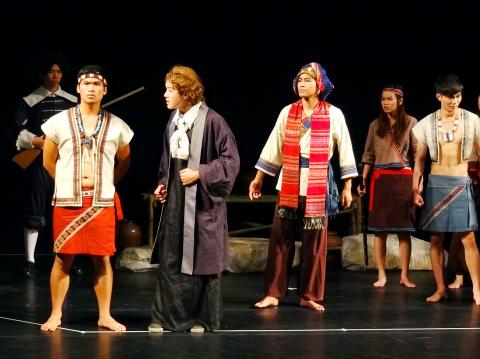There was once was a famous king in Taiwan, whose exploits were known even in Europe. Dadu King (大肚王) led the Pingpu plains tribe and is the only native Taiwanese king ever recognized by westerners. The Dutch reverentially called him Keizer van Middag, meaning “King of the Mid-Day Sun,” according to historical documents from the Dutch East Indies Company.
Until recently, most Taiwanese people had never heard of the Dadu King, while others thought he was just a mythological figure. This was due to the total neglect and deliberate erasure of Aboriginal history, through decades of Sinocentric education policies espoused by the Chinese Nationalist Party.
But with the research by historians, academics and Pingpu rights activists in recent years, the Dadu King is finally getting his due. This month, he steps out from the mist of history and into the limelight for Taiwanese audiences. Organizers said this is the world premiere of Legend of Dadu King (大肚王傳奇), a musical that presents a forgotten chapter of Taiwan’s history.

Photo Courtesy of NMTH
The show is the result of collaboration between the graduating students at the Department of Drama Creation and Application at the National University of Tainan and the National Museum of Taiwan History in Tainan, with assistance from Papora historical and cultural organizations.
Resistance against the Dutch
“The Dadu King was Aboriginal Papora royalty. He did not want to live under foreign domination, and led his people to successfully resist the Dutch and other foreign invading armies. He is a real Taiwanese hero, and we all should get to know more about his accomplishment,” said Chang Li-peng (張麗盆), chairperson of Papora Indigenous Development Council.
Chang said the name “Dadu” is derived from the Papora village-town of Tatuturo (now in Greater Taichung).
The Dadu King united the Papora people, as well as other Pingpu plains Aborigines — Pazeh, Babuza and Hoanya — to rule over an independent kingdom in central Taiwan, according to Dutch, British and Han Chinese historic records.
He was a very capable military leader, said Chang. As the Papora Warrior-King, he fought a number of renowned battles against the Dutch and successfully defended the central Taiwan regions against the invading troops of the Ming Dynasty Chinese warlord Koxinga in the 17th century, according to research by Chang and other historians who study the Pingpu plains Aborigines.

May 18 to May 24 Pastor Yang Hsu’s (楊煦) congregation was shocked upon seeing the land he chose to build his orphanage. It was surrounded by mountains on three sides, and the only way to access it was to cross a river by foot. The soil was poor due to runoff, and large rocks strewn across the plot prevented much from growing. In addition, there was no running water or electricity. But it was all Yang could afford. He and his Indigenous Atayal wife Lin Feng-ying (林鳳英) had already been caring for 24 orphans in their home, and they were in

On May 2, Chinese Nationalist Party (KMT) Chairman Eric Chu (朱立倫), at a meeting in support of Taipei city councilors at party headquarters, compared President William Lai (賴清德) to Hitler. Chu claimed that unlike any other democracy worldwide in history, no other leader was rooting out opposing parties like Lai and the Democratic Progressive Party (DPP). That his statements are wildly inaccurate was not the point. It was a rallying cry, not a history lesson. This was intentional to provoke the international diplomatic community into a response, which was promptly provided. Both the German and Israeli offices issued statements on Facebook

President William Lai (賴清德) yesterday delivered an address marking the first anniversary of his presidency. In the speech, Lai affirmed Taiwan’s global role in technology, trade and security. He announced economic and national security initiatives, and emphasized democratic values and cross-party cooperation. The following is the full text of his speech: Yesterday, outside of Beida Elementary School in New Taipei City’s Sanxia District (三峽), there was a major traffic accident that, sadly, claimed several lives and resulted in multiple injuries. The Executive Yuan immediately formed a task force, and last night I personally visited the victims in hospital. Central government agencies and the

Australia’s ABC last week published a piece on the recall campaign. The article emphasized the divisions in Taiwanese society and blamed the recall for worsening them. It quotes a supporter of the Taiwan People’s Party (TPP) as saying “I’m 43 years old, born and raised here, and I’ve never seen the country this divided in my entire life.” Apparently, as an adult, she slept through the post-election violence in 2000 and 2004 by the Chinese Nationalist Party (KMT), the veiled coup threats by the military when Chen Shui-bian (陳水扁) became president, the 2006 Red Shirt protests against him ginned up by